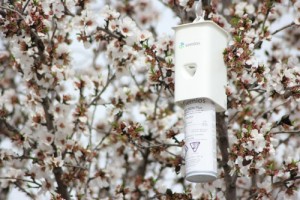Semios Receives EPA Approval for Aerosol Pheromone

Semios NOW Plus pheromone aerosol dispenser in flowering nut tree (PRNewsFoto/Semios)
Semios, a provider of real-time agricultural information and precision pest management tools, has received U.S. Environmental Protection Agency approval and California Department of Pest Regulation approval for aerosol pheromone biopesticide products that disrupt the mating of the Navel Orangeworm (NOW).
Michael Gilbert, Founder and CEO of Semios said, “The Navel Orangeworm pest causes significant loss of crop and revenue in the California almond and pistachio industries and it’s getting worse every year. The Semios NOW pheromone aerosol formulas give farmers the ability to reduce and control pest populations and, as a result, significantly reduce crop damage. The Semios pheromone aerosol dispenser is part of a custom designed controller and sensor network that gives farmers decision-making tools and remote access to the field conditions in real-time all day, every day.”
The Semios platform includes in-field camera traps that monitor the number of pests and flight strength, which when combined with wind, temperature and other environmental conditions measured and reported by Semios, optimize pheromone deployment. The combination of traps, pheromone dispensers and other sensors on the same network means farmers can deploy the right amount of pheromones where and when needed through a single interface.
Semios NOW Plus and Semios NOW Standard (for organic growers) are available for control of NOW in orchards growing walnuts, pistachios, almonds, dates, figs, citrus, pome and stone fruits.
Pheromones are a naturally occurring part of the communication systems used by insects. Semios uses pheromones to disrupt the mating cycle of insects, thus diminishing pest populations and reducing crop damage. Pheromones do not kill or damage the target insects and, as pheromones are species-specific and only target the specific pest, pollinators and other beneficial insect species are not affected, Semios said.






